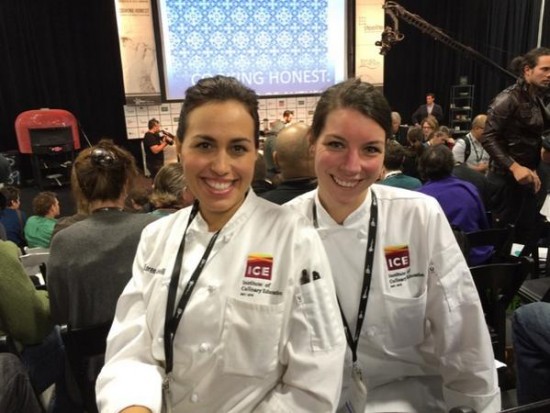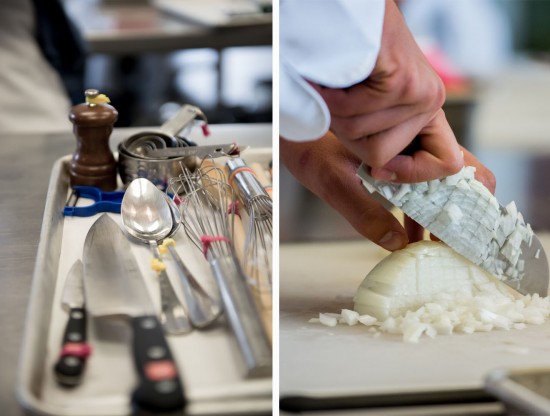Hi! My name is Lizzie Powell. I’m a public relations professional turned ICE Culinary Arts and Culinary Management student from Atlanta, Georgia. As I make this major shift in my career path, many people have asked why I chose to “take the leap” and go to culinary school.
 The answer is simple: for me, going to culinary school seems like the best way to gain both valuable skills and feel more confident in my decision to change professional direction. While I’m not sure if my future will lie in catering, a restaurant or food media, I know one thing will stay constant throughout my time at ICE: my passion for food and a desire to learn new things.
The answer is simple: for me, going to culinary school seems like the best way to gain both valuable skills and feel more confident in my decision to change professional direction. While I’m not sure if my future will lie in catering, a restaurant or food media, I know one thing will stay constant throughout my time at ICE: my passion for food and a desire to learn new things.
Over the next seven months or so, I’ll be diving into various cooking methods, international cuisines and even baking techniques. So join me as I share my experiences with you on ICE’s blog.
On my first day of the Culinary Arts program, my mind was racing: What would my instructor be like? Would my classmates be more experienced than me? How would I memorize all of the culinary terminology? And, worst of all: would I cut myself?
Lo and behold, I’m two weeks into class and all these worries have faded into the background. Aside from feeling like I'm on Chopped every time I present my julienned carrots, paysanne potatoes or small diced tomatoes to Chef Ted for review, I've learned that culinary training isn’t nearly as intimidating as I expected.
In each lesson, before I ever pick up a knife, the ICE instructors give detailed demonstrations and explain each technique carefully. As a result, in a matter of weeks, I've learned core knife skills, important details of food sanitation and how to fabricate fish and seafood, as well as how to properly caramelize onions and purée potatoes.
The most surprising thing about everything I’ve learned to-date is how precise you have to be with your knife skills. The average person may not notice if her potatoes are cut into perfect half-inch cubes, but in the culinary world, this precision is taken very seriously. After cutting many “trapezoidal” potatoes, as Chef Ted says, I discovered that the slightest adjustment to the angle of my knife could make a world of difference.
Outside of class, I've also made sure to do my homework—and I'm not just talking about the reading or writing assignments given to us by Chef Ted. Whether you're thinking about going to culinary school, are a current student or are already working in the industry, here are a few lessons I’ve learned so far on how to stay up-to-date on what's going on in the food world.
- Read, read, read. The food industry is constantly changing, and the easiest way to keep up with trends is to read industry news. To do this, subscribe to local and national food news publications (like Eater and Tasting Table), read the New York Times Dining and Wine section and follow leading food magazines (like Edible and Bon Appétit) on social media. I’ve personally found that reading these publications has helped me learn about key industry professionals, food trends and restaurant news—all of which are important when you have a stake in the industry’s game.
- Volunteer as much as possible. Volunteer events are a great way to network and gain exposure to culinary leaders from across the country. If you’re an ICE student, the weekly newsletter is always chock-full of upcoming opportunities to get involved! I recently had the chance to volunteer at the StarChefs International Chefs Congress, a trade show for culinary professionals and vendors, and the connections I made there were incredible. Not only was I able to assist food vendors with prep work and their products, but I was able to meet such reputable chefs as Jeff McInnis and Janine Booth of Root and Bone. Plus, I got to listen to lectures from industry leaders, like Dan Barber of Blue Hill at Stone Barns. For me, this conference was the first experience I’ve had where I was thrown into the thick of the culinary networking world. While it was intimidating at times (like when I was standing right next to Marcus Samuelsson), it was great to be surrounded by such successful chefs and to be so submerged in the culinary culture.

- Attend demonstrations and lectures. I also had the opportunity to attend a free presentation and tasting with Urbani Truffles, one of the world’s most respected truffle producers, at ICE. Not only are these events open to students, but alumni can attend for free as well. Click here for the upcoming schedule!
Throughout the next few months, I’ll share more interesting facts, challenging techniques and helpful tips I’ve picked up in class, as well as personal stories about day-to-day life as a Culinary Arts and Culinary Management student. If you have any specific questions about my experience, feel free to ask in the comments below!
When it comes to the benefits of an ICE education, no one can tell you more than our students. Click here to read more of their stories!


